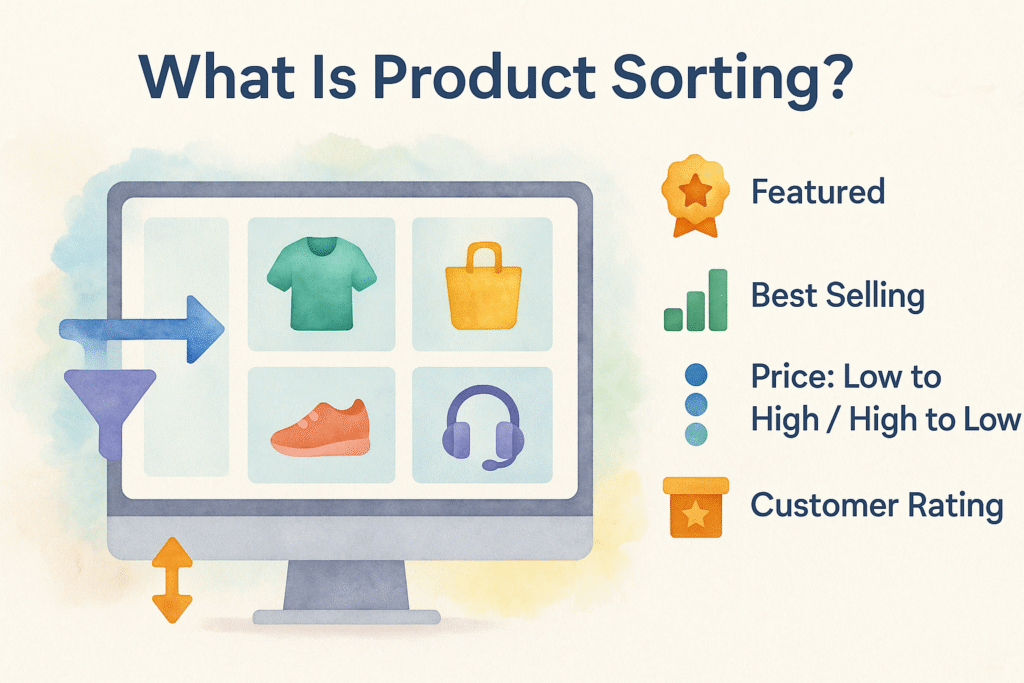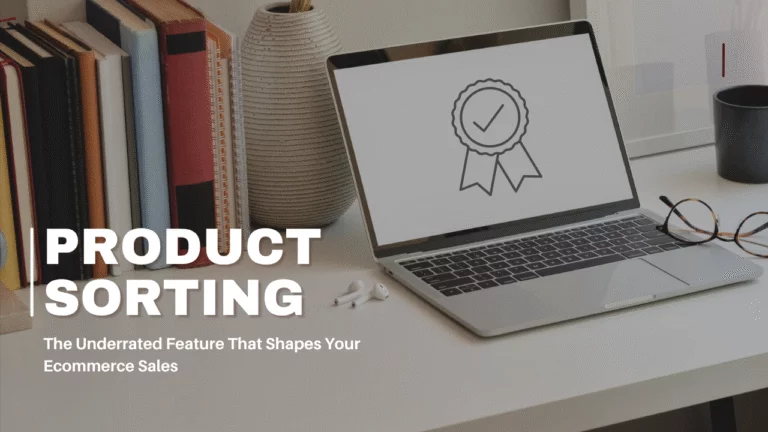In ecommerce, what your customer sees first often determines what they buy. That’s why product sorting—the order in which items appear on your store—is one of the most influential tools for guiding user behavior and increasing conversions.
While filters help narrow down choices, sorting shapes the entire shopping experience. Done right, it boosts discoverability, lifts average order value (AOV), and keeps customers engaged. Let’s dive into how it works and how to make it work smarter.
What Is Product Sorting?
Product sorting refers to the method used to organize and display products in your ecommerce store—especially on search result pages, category pages, and collection grids.

Common default options include:
- Featured (curated by store admin)
- Best Selling
- Price: Low to High / High to Low
- Newest Arrivals
- Customer Rating
But smart ecommerce brands go beyond defaults—with dynamic sorting based on real-time data, personalization, and intent signals.
Why Product Sorting Matters
| Reason | Why It Impacts Conversions |
|---|---|
| Improves UX | Makes shopping intuitive and enjoyable |
| Reduces Decision Fatigue | Shoppers see the most relevant options first |
| Highlights High-Performers | Surface best sellers and high-margin items |
| Increases AOV | Sorted upsells and cross-sells boost basket size |
| Drives Faster Decisions | Shortens time-to-purchase by showing winners early |
Types of Product Sorting Strategies
1. Manual (Curated) Sorting
Sort based on seasonal campaigns, new drops, or promotions.
Best for: Highlighting specific SKUs, launching collections
2. Behavioral Sorting
Adjust order based on clicks, views, and conversions.
Best for: Adapting to real-time shopper trends
3. Personalized Sorting
Display products based on a user’s past purchases, location, or preferences.
Best for: Returning visitors and logged-in users
4. Inventory-Aware Sorting
Prioritize items in stock or with surplus inventory.
Best for: Avoiding frustration and moving slow stock
5. AI-Powered Sorting
Use machine learning to combine factors like relevance, margin, and user behavior.
Best for: Scalable personalization at every level
Where to Implement Smart Product Sorting
- Search Results Pages → Show most clicked + most purchased items first
- Category Pages → Surface trending products dynamically
- Homepage Grids → Auto-curate based on popularity or intent
- Mobile Views → Prioritize minimal sorting options for smaller screens
- Sale Pages → Highlight discounts without burying top-value items
How ExpertRec Enhances Product Sorting
ExpertRec uses real-time data to deliver intelligent product sorting through:
- AI-based ranking
- Click + conversion signals
- Custom merchandising rules
- Inventory sync for stock-based sorting
- Dynamic personalization by device or location
It ensures that the right products show up first, every time.
Conclusion: Smart Sorting = Higher Sales
Product sorting isn’t just a UX tweak—it’s a conversion lever. The way you organize your store directly shapes shopper behavior. When you align sorting with customer expectations, inventory goals, and user intent, you create a shopping experience that sells.
Because in ecommerce, the order of products isn’t just visual—it’s strategic.
Frequently Asked Questions
1. What is product sorting in ecommerce?
It’s the method of organizing and displaying products based on criteria like popularity, price, rating, or relevance.
2. Why is product sorting important?
It helps users discover the right products faster, reduces friction, and improves conversions.
3. Should sorting be the same for all users?
No. Personalizing sorting based on user behavior or context improves results.
4. Can I use AI for product sorting?
Yes. Tools like ExpertRec provide AI-driven product ranking based on real-time user signals.
5. How do I choose the right default sort?
Start with “Best Selling” or “Recommended” and test variations using analytics data.




